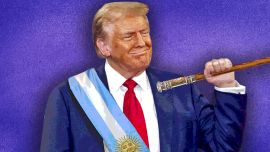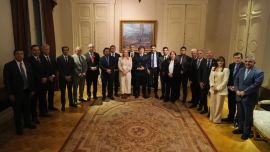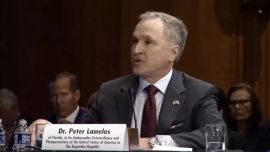Javier Milei was as surprised as anyone by what happened last Sunday when, contrary to expectations, his party – which depends almost entirely on his personal image – left the rest of them trailing in the dust in the midterm elections. He said its victory was “a miracle” and, for a while, it looked as though he was well aware that La Libertad Avanza’s strong performance was due less to its own merits than to dislike of the principal alternative. But as the days passed, Milei showed himself to be increasingly inclined to attribute its success to his own charisma and to his sister Karina’s tactical shrewdness.
That suggests that Milei is flirting with the notion that he is so popular he can brush off persuasive rumours of corruption in the libertarian inner circle and he can carry on treating like dirt anyone who dares to disagree with him. As for the administrative incompetence of his government, that will be something voters are prepared to put up with because improving matters would mean giving many key jobs to members of the despised political “caste.”
If these are the conclusions Milei has reached, it will be even harder for him to get anywhere near his very ambitious goals than would otherwise be the case. It would also be delusional. At least half of the over nine million people who voted for candidates linked to La Libertad Avanza did so not because they are devoted fans of Milei but because the last thing they wanted to see was yet another Peronist government, with the extraordinarily corrupt Cristina Fernández de Kirchner in the role of spiritual leader, looting their country.
Fears of what vengeful Kirchnerites would then do were intensified by the mayhem on the financial markets in the weeks preceding the elections. Instead of harming the government, as by rights it should have done, the turmoil helped concentrate minds. It was generally appreciated that – even if Milei’s Economy Minister Luis Caputo had made big mistakes in his efforts to control the exchange rate – a weakened government would be quite unable to stave off default and prevent Argentina from suffering yet another economic meltdown.
Luckily for a great many people, that threat was averted by US President Donald Trump and his Treasury Secretary Scott Bessent, who stepped in to defend the peso and, while about it, warned that were the electorate to punish Milei, they would withdraw their support. Their blatant meddling in the country’s internal affairs raised many hackles and brought to mind the rather similar attempt, 80 years ago, of the US Ambassador Spruille Braden to stop Juan Domingo Perón – whom he and many others regarded as a carbon copy of Benito Mussolini – in his tracks. Braden’s failure to do so greatly contributed to Argentina’s long decline in a world dominated by the United States. Few here want to see history repeat itself.
Just how much Trump’s decision to bankroll Milei influenced the electorate is impossible to say, but it surely weighed on many people’s minds when they went to the polling booths. They understood that had it not been for the US president’s willingness to throw a lifeline to his bosom friend in Buenos Aires, by then Argentina would have been embroiled in a huge financial crisis which would have affected her negatively for many years to come even if La Libertad Avanza had somehow contrived to win more votes than any of its rivals.
Back home, Trump has not shown much interest in getting on good terms with politicians who do not share his trenchant views about a great many things, but it would seem that – presumably prompted by Bessent and US Secretary of State Marco Rubio – it is what he thinks Milei will have to do. This makes sense. After all, there are plenty of pro-Mauricio Macri politicians, Radicals, independents and even Peronists who agree that Argentina needs to adapt herself to dog-eats-dog world in which even Communist China has gone capitalist and would be happy to cooperate with Milei if he treated them with respect.
Though the libertarian movement Milei engendered almost singlehandedly is capable of making a great deal of noise, it lacks the political muscle required for it to overcome the many difficulties that lie ahead. Milei insists that his objective is to make Argentina the richest country in the entire world, but if his government only manages to bring about a fairly modest degree of prosperity, most people will consider it a success. To achieve this he would have to enrol many thousands of well-prepared public servants and others who, like him, understand that there is no reliable alternative to liberal capitalism and that, unless the private sector generates enough resources, overcoming widespread poverty will remain a pipe dream.
This is what the “culture war” that Milei, like Macri when he was in office, is waging against the many who are attached to the old corporatist ways that since colonial days have underpinned Argentine political thinking. Here liberalism – of which Milei’s brand of libertarianism is an illiberal offshoot – has up to now appealed only to a minority of well-educated people who felt impressed by the success of countries elsewhere, but which of late it has grown in influence thanks mainly to the dismal failure of the stridently anti-liberal leftist and populist alternatives.
Abroad, Milei is seen as a somewhat atypical representative of the “extreme right.” He himself evidently enjoys the notoriety this gives him. In the run up to last week’s elections, progressives in North America and Europe took it for granted that he was about to suffer a humiliating and, in their view, richly deserved defeat for committing the cardinal sin of reducing public spending to a sustainable level. Great was their disappointment when they learned that his movement had done remarkably well.
In any event, if fiscal responsibility is a hateful “right-wing” heresy, many countries in Europe, among them the United Kingdom, France and Germany, will soon be subjected to a spot of chainsaw treatment because, as happened here before Milei took office, the money needed to pay for the many services politicians have bestowed on the populace in exchange for votes is in increasingly short supply. This means that they too will be faced with a choice between slashing spending and letting events take their course in the blind hope that, somehow or other, nothing really terrible happens.




















Comments